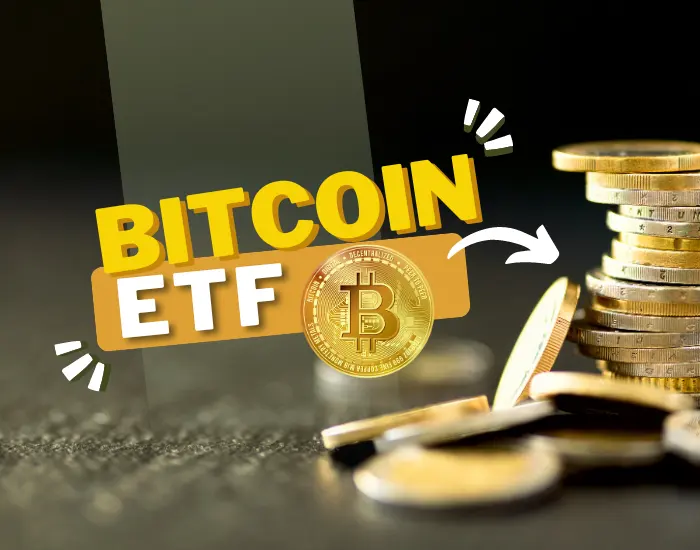
Bitcoin has exploded in popularity over the last few years, going from a fringe experiment in digital currencies to a major mainstream investment asset. This has led to increasing interest in Bitcoin ETFs (exchange traded funds) as an easy way for regular investors to gain exposure to Bitcoin through their existing brokerage accounts like 401Ks and IRAs.
But the idea of a Bitcoin ETF is also controversial. Some believe it goes against the core tenets of Bitcoin and decentralization, while others think it could reduce volatility and increase adoption. In this article, we’ll explore the key pros and cons of Bitcoin ETFs to help you decide if investing in one makes sense for your portfolio.
| Bitcoin | Buying Bitcoin Directly | Investing in a Bitcoin ETF |
|---|---|---|
| Ownership | Direct ownership of bitcoin | Own shares of an ETF, not bitcoin directly |
| Security | Responsible for secure storage | ETF provider stores bitcoin |
| Access | Full, independent access and control | Limited access, ETF provider has control |
| Tax Treatment | Favorable long-term capital gains | Less favorable short-term capital gains |
| Fees | Minimal transaction fees | Ongoing ETF management fees |
| Account Types | Limited options | Can use brokerage accounts like 401Ks |
| Volatility | More upside potential, more downside | May reduce volatility over time |
Pros of Bitcoin ETFs
While Bitcoin ETFs have some drawbacks compared to owning bitcoin directly, they offer some unique advantages that make them an appealing option for many mainstream investors. Here are some of the key potential benefits and upside to investing in a Bitcoin ETF rather than buying and holding bitcoin yourself:
Easy and Accessible Way to Invest in Bitcoin
The biggest appeal of a Bitcoin ETF is that it makes investing in Bitcoin easy and accessible for mainstream investors. Instead of having to buy and securely store Bitcoin directly, you can gain exposure simply by buying shares of a Bitcoin ETF through your brokerage account, just like you would any stock or fund. This allows people to invest passively in Bitcoin without having to learn the complex storage and security procedures required to own Bitcoin directly.
Invest Through Retirement Accounts
Additionally, buying shares in a Bitcoin ETF means you can gain Bitcoin exposure using regular investment accounts like 401Ks, IRAs and other retirement plans. This allows you to avoid tax headaches that come with directly owning cryptocurrency, which is treated as property by the IRS. With an ETF, buying and selling Bitcoin essentially becomes just another taxable event like any stock trade.
Professionally Managed Fund
ETFs have the benefit of being professionally managed investment funds. The ETF provider deals with securely storing the actual Bitcoin, so you don’t have to take on the technical responsibility and risk yourself. The fund managers work to reduce tracking error and outflows that can affect ETF performance.
Useful for Mainstream Investors Hesitant About Crypto Complexity
For mainstream investors still uncomfortable with buying and owning crypto directly, Bitcoin ETFs offer an easier transition into crypto investing. The ETF wrappers around Bitcoin take away much of the complexity around funds transfers, storage, transaction fees and security that can be intimidating.
Brings in Institutional Investors
Bitcoin ETFs could pave the way for larger institutional investors to gain exposure to Bitcoin. Many institutions have mandates that prevent them from directly owning cryptocurrencies, but they are able to buy ETFs without issue. The approval of Bitcoin ETFs makes it easier for these large investors to allocate funds and assets to Bitcoin using familiar and approved financial vehicles. More institutional money flowing in could reduce volatility.
Could Reduce Bitcoin Volatility
With increased mainstream and institutional investor participation through ETFs, Bitcoin may see a stabilization in prices and gradual reduction in volatility. Since ETFs allow for simple recurring investments in Bitcoin, huge speculative price swings driven by episodic investments could even out over time. This could make Bitcoin more usable as an actual currency or payment mechanism.
Cons of Bitcoin ETFs
Although Bitcoin ETFs provide easier access to bitcoin exposure, they also come with some downsides to consider compared to directly purchasing and owning bitcoin yourself. Critics and Bitcoin purists have raised philosophical and practical objections to the ETF vehicle. Here are some of the key cons and risks to evaluate:
Less Upside Potential Versus Direct Ownership
The flip side of Bitcoin ETFs potentially reducing volatility is that they likely reduce the upside potential compared to owning Bitcoin directly. With an ETF, you don’t have direct ownership of the underlying Bitcoins. The ETF managers have ultimate control, so you miss out on some of the exponential gains direct owners could see.
Subject to ETF Management Fees
Owning shares of a Bitcoin ETF means paying recurring management fees charged by the ETF provider to cover their costs. These can add up over time and reduce your net investment returns. ETF fees are usually a percentage of assets under management. With direct Bitcoin ownership, you avoid these costs altogether.
Less Favorable Tax Treatment
In the US, cryptocurrency held for over a year benefits from long-term capital gains tax rates when sold, which are generally lower than short-term income tax rates. But when you sell an ETF, even if the fund holds Bitcoin long-term, the gains are subject to the higher short term capital gains tax.
Defeats Bitcoin’s Decentralized Nature
A key philosophical objection against Bitcoin ETFs is that they run counter to the reason Bitcoin was created in the first place. Bitcoin was envisioned as a decentralized system of money with no central authority over it. Owning bitcoin yourself gives you full autonomy and control. But with an ETF, the fund provider ultimately holds the private keys and bitcoins, meaning they have custody and control.
Doesn’t Allow True Bitcoin Ownership
Along the same lines, when you buy shares of a Bitcoin ETF, you don’t truly own any bitcoin yourself directly. The ETF provider owns and manages the underlying bitcoins. This means you need to place trust in the ETF provider to manage the funds properly. Critics argue this intermediary contradicts the peer-to-peer design of Bitcoin itself.
Re-exposes Investors to Systemic Banking Risks
Bitcoin was created partly in response to problems seen during the 2008 financial crisis. It aimed to offer a financial system outside the traditional banking system. Bitcoin ETFs plug Bitcoin back into the centralized financial system that it was meant to avoid. If the banks backing the ETF fail, investors’ holdings are at risk. Direct Bitcoin ownership doesn’t have these systemic risks.
ETF Provider Holds the Private Keys
With a Bitcoin ETF, the provider holds the underlying private keys needed to transfer or spend the bitcoins. So unlike directly owning bitcoin yourself, you do not have full independent access and control. If the provider goes down for some reason, you may have trouble accessing your shares. This contrasts with direct ownership where you hold the keys.
SEC Approval Still Pending
While a few Bitcoin ETFs have been proposed, the SEC has not yet approved any for launch in the US. The SEC has expressed concerns around volatility, manipulation, custody and valuation. It remains to be seen if or when Bitcoin ETFs become a reality. Canada and Europe both have approved Bitcoin ETFs already.
Conclusion
Bitcoin ETFs offer an easier way for average investors to gain exposure to Bitcoin prices through traditional brokerage accounts. But they also have drawbacks compared to owning and controlling bitcoin directly yourself.
Many philosophical Bitcoin enthusiasts are against ETFs, believing they violate core principles of decentralization. On the other hand, ETFs could increase mainstream adoption and stabilize prices over the long term. As with most investing decisions, there are various tradeoffs to consider when evaluating Bitcoin ETFs versus other options.
While Bitcoin ETFs await approval in the United States, other regions are seeing rapid growth in crypto-based exchange traded products. In Europe, assets under management across all cryptocurrency ETPs (exchange traded products) hit an all-time high of $1.5 billion in November 2021 according to ETFGI data. The number of crypto ETPs listed also grew 40% year-over-year.
Canada saw similar growth with total crypto ETF assets reaching $7.2 billion (CAD) by the end of 2021. The Purpose Bitcoin ETF alone had over $2.5 billion in assets under management within the first year of launching. These statistics demonstrate surging investor demand for regulated and easily accessible cryptocurrency investment vehicles outside the US. If Bitcoin ETFs were to be approved in the massive US ETF market, assets could ramp up quickly based on the experience in Europe and Canada so far.
Bitcoin ETF FAQ
What exactly is a Bitcoin ETF?
A Bitcoin ETF (exchange traded fund) is a fund that holds underlying investments in bitcoin and issues shares that trade on exchanges like stocks. It allows investors to gain exposure to bitcoin prices without having to buy and hold bitcoin directly.
How is a Bitcoin ETF different from owning bitcoin yourself?
With a Bitcoin ETF you don’t directly own any bitcoin. You own shares of the fund, which in turn owns the underlying bitcoin. The ETF provider handles custody and security. So you don’t have full control like direct ownership.
What are the main advantages of investing in a Bitcoin ETF?
Key advantages include easy access through normal brokerage accounts like IRAs, not having to worry about securely storing bitcoin yourself, potentially less volatility, and simplified tax treatment.
What are the main risks or downsides of Bitcoin ETFs?
Drawbacks include lack of full independent ownership and control, being subject to ETF manager risks and fees, and less favorable tax treatment when selling compared to long-term bitcoin capital gains.
When will Bitcoin ETFs be available to invest in?
While several Bitcoin ETFs have been proposed, none have yet been approved in the US by the SEC. Canada and Europe already have operational Bitcoin ETFs. The SEC continues to express concerns, so US approval remains uncertain.



